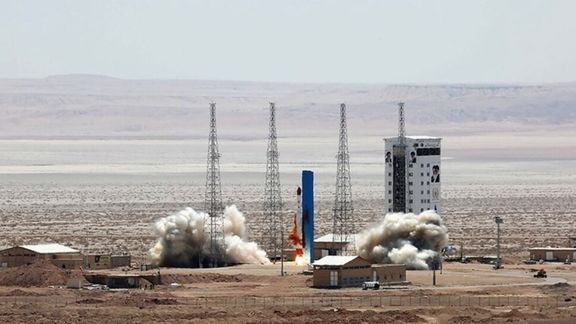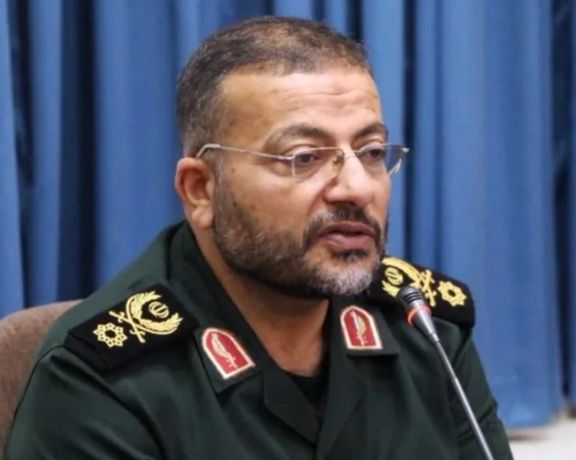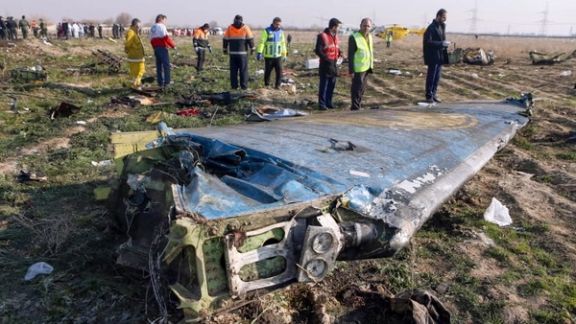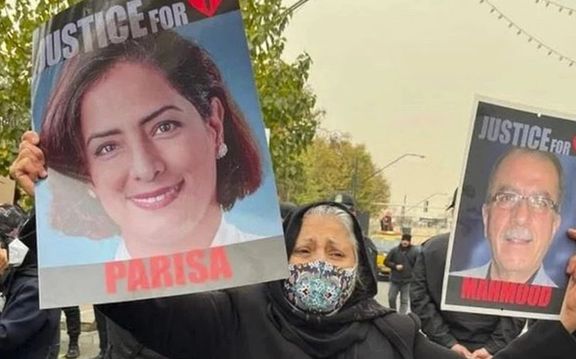Iran's Raisi Asks For Space Satellite Program To Be Beefed Up

Iran’s President Ebrahim Raisi visited a space exhibition in Tehran and asked officials to work on reaching the 36,000 km orbit around the earth in four years.

Iran’s President Ebrahim Raisi visited a space exhibition in Tehran and asked officials to work on reaching the 36,000 km orbit around the earth in four years.
Minister of Communications and Information technology, Issa Zarepour, who supervises Iran’s space program told local media that the project to reach the high orbit was planned to be accomplished in 10 years, but Raisi asked to speed up the program. The president pledged all the assistance needed to help Iran’s Space Agency.
Although some of Iran’s attempts to launch satellites have failed, it currently has four satellites in low orbit. In April 2020, a military satellite called Nour 1 was launched.
In February, the defense ministry said it tested a new satellite carrier rocket for an orbit of less than 500 km.
The United States and other countries are concerned that Iran’s satellite program is a cover for developing ballistic missiles that can exceed the current 2,000 km range of Iranian missiles.
Zarepour also said that Raisi emphasized the need to commercialize Iran’s rocket and space capabilities by exporting expertise and engineering knowhow.

The general commanding Iran’s paramilitary Basij, said Thursday that his social media activists would be given equipment and technical support to boost their work.
Brigadier General Gholamreza Soleimani was speaking to Defa Press, news agency of the armed forces, two days after he told the Basij Digital Content Creation event in Tehran that a “people's network in cyberspace…means that the Iranian nation has deployed technology in the battlefield.”
In September Soleimani said that an “era of hit-and-run in cyberspace" was over and that the Basij needed a more systematic approach.
Ali Fadavi, deputy commander of the Revolutionary Guards Corps, which supervises the Basji, in a speech Wednesday warned Basij members of that the Islamic Republic is under attack and cultural “war…happening inside our houses and in the mobile phones in our pockets and our hands.” He called on them to "enter the battlefield."
Organized trolling has been for some time a feature of Iranian politics, helping to spread untruths and unsubstantiated allegations. Iranian authorities, including Supreme Leader Ali Khamenei refer to state-sponsored social-media activists as "cadets of the soft war.”
Iranian activists often allege that the IRGC and other state bodies sponsor organized trolls on social media to anonymously threaten, attack and discredit dissidents and to disseminate fake news.
The Basij has around 5 million members, according to leading academic authority Saeed Golkar, with around 200,000 cadres and special Basij, who can act as a paramilitary support to police and security forces. Thousands of members are active on social media to counter news, information and critical opinions disseminated on social-media including by Persian-speaking media abroad.
Besides maintaining extensive network of social media activists, the Islamic Republic also devotes an unknown measure of resources to control the Internet, block thousands of websites and ban foreign social media platforms such as Facebook, You Tube and Twitter. Almost every Iranian has to resort to VPNs and other tools to have access to blocked sites.
A recent study published by the Media Quarterly in Iran shows that the daily readership of Iranian newspapers and the audience of state television have plummeted dramatically during the past two years due to various factors including the loss of public trust, censorship and greater popularity of online media and social media as a source of news and information.
The Telegram messaging application, for instance − which is blocked but accessed through VPNs and anti-filtering software − has over 49 million users in Iran with at least 150 channels having, over 1 million subscribers. Instagram, which is not blocked, has a similar number of users. Many Iranian politicians and their supporters, including former principlist president Mahmoud Ahmadinejad, as well as a range of activists, have popular channels on Telegram and Instagram accounts.

The 2020 downing of a Ukrainian jetliner by Iran was the responsibility of high-level Iranian officials, not an accident as Tehran claimed, families of victims said in a report on Wednesday.
The report by an association composed of mostly Canadian families of Flight PS752 victims challenges Iran's official findings that blamed a misaligned radar and an error by the air defense operator for downing the plane shortly after it took off from Tehran's Airport in early morning on January 8 2020. All 176 people aboard were killed.
Iran for three days denied that the airliner was shot down and claimed it was an accident. After it acknowledged that two missiles fired 30 seconds apart had brought the plane down, it refused an independent investigation and tried to withhold information from Ukraine and Canada.
Iran's civil aviation body, which had responsibility for investigating the crash, said the operator mistook the jet for a missile at a time when tensions were high between Tehran and the United States. Hours earlier, Iran had fired ballistic missile at US bases in Iraq and was probably expecting a response.
A Canadian investigation in June which condemned "those responsible" but found no evidence that the tragedy was premeditated, but critics say that the country’s top leadership decided to leave the civilian airspace open at a time of high military tension on that day..
"It is the belief of the association that high-ranking officials of Iran are responsible for the downing of Flight PS752 and not just a handful of low ranking...members as per the claims of the government of Iran," the association report said.
"At the highest levels of military alertness, the government of Iran used passenger flights as human shield against possible American attacks, by deliberately not closing the airspace to civilian flights," it said.
Association president Hamed Esmaeilion told a virtual news conference: "We think that the downing of PS752 was a deliberate act."
The Iranian foreign ministry was not immediately available to comment.
The association said it based its report on public information and recordings of "high-ranking Iranian officials" among its sources and was prepared with assistance from aviation and legal experts.
It is not an official air crash accident report, which is designed to focus not on liability but how safety can be improved in the future.
The report said the missile system operator was experienced and should have been able to distinguish the jetliner from a cruise missile.
The trial of ten lower-level military personnel opened in Tehran on Monday. Many families in Iran refused to recognize the trial and protested outside the courtroom.
A Canadian government spokeswoman said the country is analyzing the report, which calls for an international investigation. Many of the victims killed in the crash were Canadian citizens or permanent residents.
Canadian Foreign Affairs Minister Melanie Joly tweeted on Tuesday that the country "stands with Ukraine" in its decision to not take part in PS752 hearings at a military court in Iran, calling for "transparency in the criminal proceedings."
With reporting by Reuters

A top commander of Iran's Guards has said Tuesday, “Enemies have concluded that if they fail to dominate us by 2025, they will never be able to inhibit Iran.”
Yadollah Javani, the political deputy to the chief commander of the Islamic Revolution Guard Corps (IRGC) also opined that the purpose of negotiations with Iran is to establish dominance.
“America today has reached the conclusion that confrontation with Iran is useless and intends to gain leverage through negotiations, tabling the issues of missiles and the nuclear [program], counting on soft power,” Javani said.
Meanwhile, Israel’s Finance Minister Avigdor Lieberman on Tuesday told a security conference that “With or without an agreement, Iran will be a nuclear state and have a nuclear weapon within five years, tops."
At the same time, the chief commander of IRGC, Hossein Salami said Tuesday that the Islamic Republic can dictate to the United States because, “Today’s America is much weaker than what it was 43 years ago,” and in balance of power, Iran is becoming equal to the US.
Salami is known for lofty statements, often claiming that the IRGC or the Islamic Republic have unparalleled power in the region and intimidate even the American military.

Israel’s defense minister Benny Gantz accused Iran on Tuesday of carrying out drone attacks on maritime targets from bases in Chabahar port and Qeshm island.
Gantz also said that these sites were also used to store combat drones.
Iran’s military drone program has expanded in recent years and UAV’s have been more frequently used in recent months both on land and at sea.
Separately, the chief of Israel's air force proposed working with Arab partners - such as the United Arab Emirates and Bahrain, with which Israel formalized ties last year - against the drone threat.
Iran has been accused of attacking tankers in the Persian Gulf region since 2019 when several vessels were hit by what was described as limpet mines. Iranian naval forces have also seized tankers, most recently in late October, when they forced a Vietnamese-flagged tanker into Iranian waters.
Gantz made the allegation, which he described as a first public disclosure, during a televised speech at a security conference hosted by Reichman University.
Chabahar is a port city on the Sea of Oman near Pakistan from where Iranian forces can project power into the Indian Ocean and to the shores of Oman. Frequent naval drills take place in the region.

The trial of ten military personnel involved in shooting down a Ukrainian airliner in 2019 began in Tehran Monday with some parents boycotting the proceedings.
Families of some of those killed in Iran’s downing of Ukrainian Airlines Flight PS752 on January 8, 2019 say the trial of those allegedly responsible lacks transparency and due process. "This a shameful show with ten low-ranking officers on trial," said Hamed Esmaeilion, the Canada-based spokesman for some of the families, Sunday.
Abbas Abdi, a reformist politician, in a tweet Monday also criticized the authorities. "Make the trial transparent,” he wrote. “It will be in everyone's interest," he wrote.
The passenger plane was hit by two surface-to-air missiles in the tense aftermath of Iran's missile attack on United States military bases in Iraq in retaliation for the US killing of Iranian general Ghasem Soleimani and nine others in Baghdad. All 176 onboard died.
Among those protesting outside court were family members either barred from attending or refusing to acknowledge the court. Protesters held photos of victims and chanted slogans, while surrounded by police and security forces who kept others away.
Names, ranks, and positions of the suspects were not disclosed. Victims' families and critics say those on trial are not responsible for decisions taken at a higher level on the night of the incident. They say Amir-Ali Hajizadeh, the Revolutionary Guards aerospace commander was responsible because he did not “clear the airspace.”
Hajizadeh commented last week on the tragedy, which Iran attributed to the misalignment of a mobile surface-to-air missile battery at a time of high alert. "How is it possible that a plane so huge cannot return to the airport and land [after being hit] by a few kilos of explosives?" Hajizadeh asked a gathering of Sharif University students November 15.
In response Abolfazl Najafi-Tehrani, a dissident cleric and publisher in Tehran tweetedNovember 17: "It is not too far-fetched that few years from now Hajizadeh and Co. ask there is a question of why the Ukrainian plane placed itself in the path of our missile to cause this incident and to demand the families of the victims and the Ukrainian airliner to pay for the missiles that the plane hit itself against!"
In another reaction reformist politician Mostafa Tajzadeh tweeted: "The nation's question is why you couldn't tell the difference between the Ukrainian passenger flight and an enemy missile [to shoot at it]? Why two [missiles]? Why did you lie to the world for several days?"
The Ukrainian ambassador refused an invitation to attend the trial. Ukrainian journalist Anna Rajskaya tweeted Sunday that the ambassador did not want to legitimize the trial given the Ukrainian deputy justice minister had said Iran’s investigation was inadequate.
A date for the next session has not been announced.